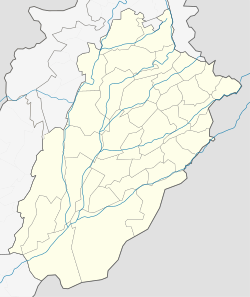Jhelum, Pakistan
|
Jhelum جہلم |
|
|---|---|
| City | |
| Nickname(s): City of Soldiers Land of Martyrs and Warriors |
|
 Map of Jhelum City |
|
| Location within Pakistan | |
| Coordinates: 32°56′33″N 73°43′32″E / 32.94250°N 73.72556°ECoordinates: 32°56′33″N 73°43′32″E / 32.94250°N 73.72556°E | |
| Country | Pakistan |
| Province | Punjab |
| District | Jhelum |
| Union Councils | 7 |
| Area | |
| • Total | 22.5 km2 (8.7 sq mi) |
| Elevation | 233 m (768 ft) |
| Population (1998) | |
| • Total | 145,847 |
| • Density | 6,500/km2 (17,000/sq mi) |
| Time zone | PKT (UTC+5) |
| Postal code | 49600 |
| Dialling code | 0544 |
Jhelum /ˈdʒeɪləm/ (Urdu, Punjabi: جہلم) (Greek: Αλεξάνδρια Βυκεφάλους Alexandria Bucephalous) is a city on the right bank of the Jhelum River, in the district of the same name in the north of Punjab province, Pakistan. Jhelum is known for providing a large number of soldiers to the British Army before independence and later to the Pakistan armed forces due to which it is also known as city of soldiers or land of martyrs and warriors. Jhelum is a few miles upstream from the site of the Battle of the Hydaspes between the armies of Alexander of Macedonia and Raja Porus. A city called Bucephala was founded nearby to commemorate the death of Alexander's horse, Bucephalus. Other notable sites nearby include the 16th-century Rohtas Fort, the Tilla Jogian complex of ancient temples, and the 16th-century Grand Trunk Road which passes through the city. According to the 1998 census of Pakistan, the population of Jhelum was 145,647 and in 2012 its population is 188,803. The name of the city is derived from the words Jal (pure water) and Ham (snow), as the river that flows through the river originates in the Himalayas. There are a number of industries in and around Jhelum city, including a tobacco factory, wood, marble, glass and flour mills.
...
Wikipedia


